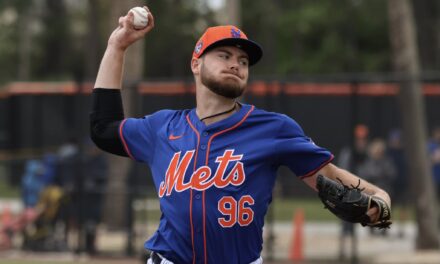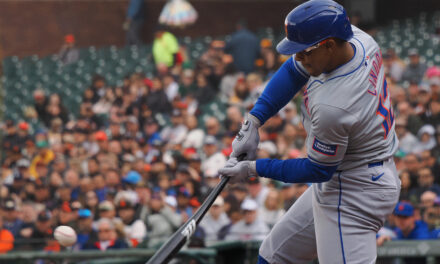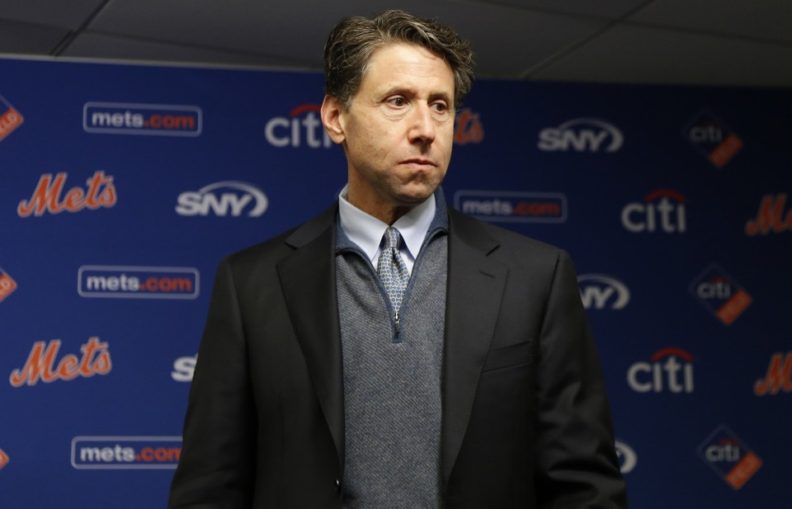
In another rare public showing, Jeff Wilpon spoke to reporters on Sunday, answering questions about the Mets. Wilpon spoke at length about the Mets’ GM search (which has reportedly been in progress since June despite the Mets not having interviewed a single candidate), but he also addressed the disappointing 2018 season.
Jeff Wilpon: “I can promise you ownership is disappointed. … The effort was there, but the talent wasn’t.” Adds that it’ll be on the new GM to fix that.
— Tim Healey (@timbhealey) September 30, 2018
The last part of that tweet is truly a damning indictment of the Mets’ ownership problems – that the Wilpons can’t get out of their own way, and they either can’t realize or refuse to admit that they are the main obstacle to the Mets contending in the NL East.
Let’s talk about this problem, that “the effort was there but the talent wasn’t.” Why wasn’t the talent there? This is undoubtedly a talented Mets team—that they had three of the best starters in the majors this season (Noah Syndergaard, Zack Wheeler, and Jacob deGrom) along with Brandon Nimmo, Amed Rosario, and Jeff McNeil breaking out is evidence enough of that. There exists a talented young core for the Mets to have built around, and that core has largely been intact since the Mets’ magical 2015 postseason run.
The missing talent was truly in the secondary—while the core of the team was exceptionally good, the rest of the team was exceptionally bad. Jason Vargas and Jay Bruce, despite finishing the season strong, still ended with a 5.88 ERA in 92 innings and a .224/.310/.372 OPS in 358 PA, respectively. The Mets played Adrian Gonzalez (.237/.299/.373) in more than a third of their games. Anthony Swarzak had the single worst season of his career. I don’t even need to quantify how bad Jose Reyes has been. All of these players were acquired this offseason to complement the core, and all of them miserably failed.
This all sounds like I’m augmenting Jeff’s statement, that the general manager was to blame for the poor season. But at the same time, according to Matt Ehalt of NorthJersey.com, many of these signings were made despite opposition from the analytics department. Sandy Alderson has made a reputation for himself as an analytically minded general manager, so it immediately seems dubious that he would go along with signings that his own front office recommended against and philosophically opposed.
Remember, in 2004, when the Mets signed Mo Vaungh, Mike Piazza, and Al Leiter to big contracts, the Wilpons were directly involved. It was “the Wilpons alone [choosing] to give another fading veteran, Tom Glavine, a four-year, $38.5 million deal.” Peter Gammons said in 2009 that Omar Minaya was not the real GM of the Mets—Jeff Wilpon was. Marc Carig for Newsday just last year reported that the Wilpons operate with complete control of payroll. The same consistent story has emerged repeatedly during the Wilpons’ tenure as owners—that they maintain a large degree of control over the way that the team operates, to a degree that overrules the general manager many times.
The Mets acquired the same brand of milquetoast, aging free agent veterans after a playoff push in 2000. They did it after a playoff push in 2006, and after a playoff push in 2015. Each time, these moves have been made under different general managers. Each time, the only constant has been the Wilpons. So pardon my skepticism, given that we’ve seen the same story repeatedly with only the Wilpons in power, that Sandy Alderson was truly to blame for acquiring free agents that he appears to philosophically oppose.
And then there’s also the problem of payroll. According to Cot’s Contracts, here are the Mets’ opening day payrolls since 2004.
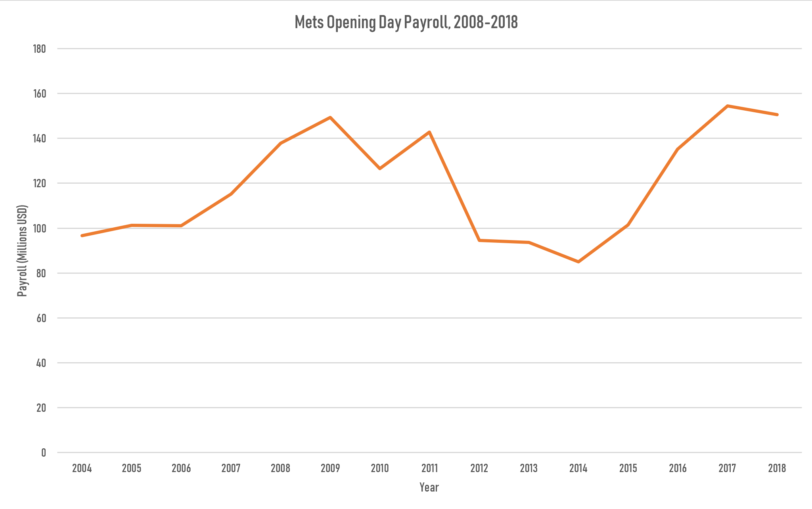
Notice that the increase in payroll lags playoff success by a good bit. That’s totally normal! It’s the nature of having a young core costing very little in pre-arbitration. But consider that these cores grow more expensive in the next season after, and the season after that. If a team wants to keep their core together, it costs more, and it requires spending to augment and complement the core. From this chart, it looks like that’s what the Mets have done. It looks like the Wilpons have done their due diligence with regard to spending on the team to keep the team in contention. Until you look at another team that has actually done their due diligence to remain in contention.
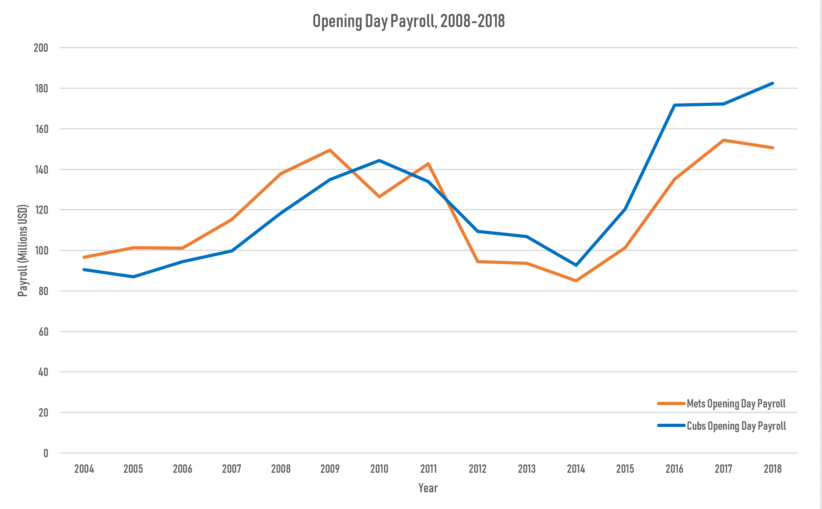
The Cubs made the postseason 2007 and 2008 and then began their stretch of dominance with a Wild-Card game berth in 2015 – so the Mets and Cubs have roughly coincided with regards to when their windows of contention opened. The Mets and Cubs also similarly struggled to stay in contention from 2009 onward, cut payroll, and started to rebuild. The Cubs acquired a great young core as well—instead of Matt Harvey, deGrom, and Syndergaard, the Cubs put together Kris Bryant, Anthony Rizzo, and Addison Russell.
The reason why the Cubs have stayed in contention, consistently and reliably, is because they kept spending to augment their core. They outspent the Mets every step of the way, and in 2018 after missing the World Series, they increased payroll by about $10 million. They spent on Jason Heyward, they spent on Jon Lester, they spent on Ben Zobrist. These players were not cheap and their signing indicated that the Cubs were unconcerned with obtaining the most bang for their buck. Investing in good players is not cheap! But it is smart.
In 2018 after losing 92 games, the Mets cut payroll by about $5 million.
The 2018 Mets fared little better than the 2017 Mets after fewer resources were invested in the team, and invested unintelligently. The Mets continue to insist on bargain bin hunting, trying to find the best bang for their buck, when all of the other teams around them understand that truly good talent does not come cheap.
There is no reason for any general manager to want to come to the Mets. The Wilpons have repeatedly demonstrated that they want to be the ones making the big decisions. They have cut payroll under the pretense of “smart spending” while making it seem as though they will be a competitive team. And they have indicated that if the Mets, who have finished under .500 for a second consecutive season despite a historically great season from their starting rotation and breakout performances from numerous young players, fail to succeed in a suddenly highly competitive NL East, they will blame the general manager and avoid any responsibility for their own poor ownership. So, take Jeff Wilpon’s comments as a glimpse into the Met’s priorities this offseason. Maybe they’ll upgrade at catcher. Certainly, they’ll try to improve the bullpen.
But above all, their number one priority is to acquire a scapegoat.



